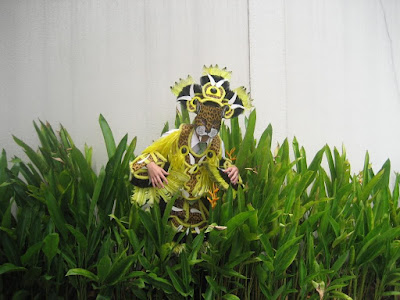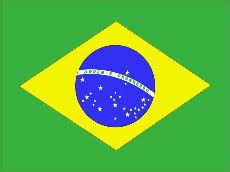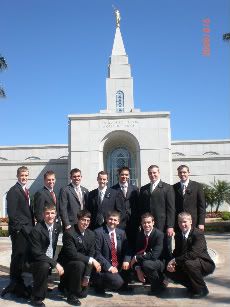The past week went better than expected. Generally, when you set a goal with regards to baptisms for a week, you have a firm idea of what is going to happen and you achieve it or, in an unfortunate event, a date falls through or gets bumped a week. For us, it was the contrary. We set out with a reachable goal of 1 baptism for the week, which in itself is great, but it worked out that another investigator, Daiane Azevedo da Silva, was 100% ready and was baptized on Sunday with her aunt, Maria José Cooper da Silva.
The last few weeks here have been wearing me down physically. You know that always tired feeling. Hopefully, today I'll steal away some P-day to go sleep.
A funny incident happened yesterday. We had marked a little reunion with some people in the street to teach and talk with them. Out of nowhere, this guy is like, "…I shine your shoes." Imagine that...in walks an English talking Brazilian shoe shiner! Being that I had a feeling he wasn't going to accept any answer other than yes, I tossed him my shoes and he shined them up nice. He turned out being pretty cool and we marked to visit him later in the week to chat. I guess he works in the center, so he learned just enough Japanese and English to talk to the tourists and give his sales pitch.
Oh yeah...transfers will be next week, so today starts my one week countdown in the office. The next email you get from me will be from another area, far away or close by...I don't have a clue. We'll be working pretty hard in the trio this week to get the area all set up for the transfer to come. Fortunately, we had ten of the people we are teaching at church on Sunday (two of which are now baptized) including a family and quite a few young adults.
One of the things I've noticed, which actually makes a lot of sense since over time my ability to communicate and understand has improved, is that in each area I seem to become friends with more and more people. In my first area, there were few people, as a person, with whom I was able to create a friendship. When it came to my second area, this number increased. And now in my third area, especially with the additional time, I feel like I know everyone that works at all the local businesses and walks on the streets within a 3 mile radius. This became evident when the people who used to wave to me shouting, "Elder," now wave and shout, "Elder Mackay!"
I thought it would be fun to give everyone back home a taste of Amazonian culture, so I'm going to stray from missionary work and give a little re-cap of the food and culture I've been able to experience in the nearly 1 1/2 years I've been in Brazil.
The food here is interesting. You can dine in the home of the extremely rich or the poorest in Manaus, but there will always be four things on the table: rice, macaroni, guaraná or fanta, and farinha...that's a given. Then, generally speaking, beans are served. This is where the variation comes into play. Depending on where you are originally from and your family's background, you might add to the beans dried beef, onion, pimentão (bell pepper), black pepper, these little green spiky vegetables, sausage, chunks of fat, intestine...you name it. The beans vary too. They have common brown, grande, white, and black beans. I'd say they are pretty racist when it comes to naming their beans. The fruits are really what sets Amazonas apart from the rest of the world. In this area, essentially every fruit will grow except grapes and apples (the colder weather fruits). For the most part, the fruits are pretty good. There are a few that I would never eat again just because they weren't to my liking, but there are quite a few like açaí, cupuaçu, taperibá (cajá), maracujá, acerola and the list goes on and on of those I really enjoy. They might have little rip-offs of açaí and maracujá back home, but nothing compares to the real thing! You just can't compete with produce that has been freshly picked off the tree.
The culture in Manaus is very interesting as well. The majority of the city has native blood, so they essentially own the place, like Native Americans back home, but they are woven a little more into society here. A lot of the economy revolves around food, clothing, and tourism, which is rarely seen by missionaries. It is a real commodity to have a car, so the majority of the population walks to their destination or takes the bus, which would explain why everyone is generally in pretty good shape. Well, that's this week's missionary news and cultural education all wrapped in one. Until next time!
Seu amigão,
Elder Taylor Mackay











































































